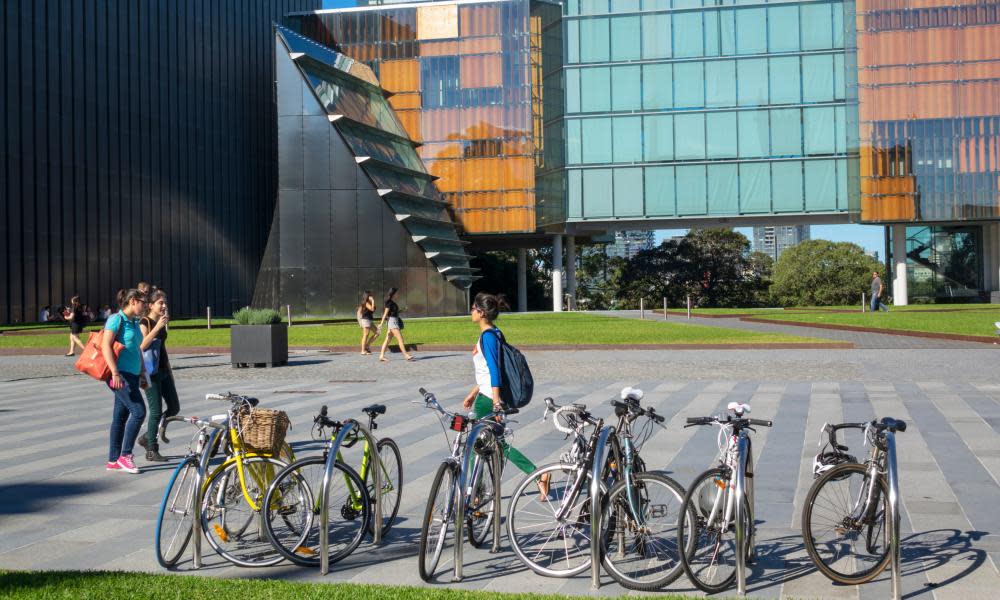Australian universities walk back their criticism of higher education changes

Universities Australia and the Group of Eight universities have softened their opposition to the Coalition’s higher education reforms, signalling they could support the bill with amendments to guarantee funding and further growth of places.
Despite fierce early criticism of the “job-ready graduates” package, the two peak bodies have offered the federal government a lifeline in submissions to the snap Senate inquiry.
Although claiming neither to support nor oppose the bill, Universities Australia called for “funding certainty” and indicated it would settle for indexation of grants to universities and a review of funding arrangements after three years.
The Group of Eight set a higher bar, but said it will support the bill if the government agrees to curb the biggest proposed fee hikes.
Related: Foreign veto laws could affect tens of thousands of research projects, Australian universities warn
The bill proposes to reduce the overall government contribution to degrees from 58% to 52% and increase fees by up to 113% for some courses including humanities to pay for fee cuts in sciences and 39,000 extra university places by 2023.
Despite initial concerns, including from Centre Alliance MP Rebekha Sharkie, the Coalition’s prospects of passing the bill are improving with the Senate crossbench keeping an open mind during the inquiry and university sector opposition softening.
Both Universities Australia and the Group of Eight want some elements of the package outside the current bill guaranteed in legislation including equity, transition and industry linkage funds.
The group said additional funding should not be at the “whim” of the education minister, which would be “disquieting in a democratic system of government”.
Both also called for additional growth in places to accommodate increased demand during the Covid-19 pandemic and for population growth.
The package offers low-growth metropolitan universities funding for a 1% growth in bachelor places, up to 2.5% for high-growth metro unis and 3.5% for regional unis.
But surging demand for university places will likely mean universities are forced to buy spare places from others or enrol students above the cap, foregoing government grants.
Universities Australia called for indexation of grants to universities and to extend demand-driven places to all Indigenous students, not just those from regional and remote areas.
But on the central question of hiking course fees, it suggested only a review after three years.
Related: Australian universities plead for fee rises to be scaled back and places increased
The Group of Eight, on the other hand, called for “more equitable student contribution amounts”, modifying the structure so no fees are hiked above the current maximum rate of $11,355.
That would curb fees set to rise to $14,500 for courses in law, economics, commerce, social studies, political science and communications.
Universities Australia chief executive, Catriona Jackson, said that after the government made “very welcome” improvements to the bill, it is now seeking that “more of the package should be protected in legislation”.
“Currently, all of the reductions in funding are legislated, while the initiatives funded by these reductions [including growth in places and indexation of funding] are not,” she said.
“Certainty and stability are in short supply for university students and staff right now.
“Legislating these additional changes will bring some certainty around policy settings.”
The Group of Eight also asked the government to fix “conflicting incentives for students and universities” – a reference to the fact fee cuts are designed to lure students to sciences but less revenue for those subjects will push universities to enrol more in higher-fee humanities.
The group’s solution was to ensure that “no course that is incentivised for students by lowering a student contribution amount is disincentivised for universities by a lower total funding amount” from government and student funding.
“The bill should include growth funding and ensure that total per student funding does not decrease so that universities are resourced to fill extra places to satisfy greater anticipated demand,” it said.
Related: Regional universities urge Coalition funding changes to be passed as Senate inquiry approved
The group also rejected extra audits of universities and “student protection measures” which could see students cut off from commonwealth funding for failing more than half of their first eight subjects.
Universities Australia said audits should only occur “on the basis of genuine and demonstrated risk”.
The Regional Universities Network has offered its support for the bill after the Nationals negotiated changes and Australian Technology Network has expressed qualified support with some proposed amendments.
The National Union of Students has rejected any possible compromise. Its president, Molly Willmott, said “no part of this package is redeemable”.
“For every positive initiative introduced, there are fee increases, funding cuts, and students who will be barred from accessing the critical Hecs/Help loan scheme upon failure to academically succeed.”

 Yahoo News
Yahoo News 
